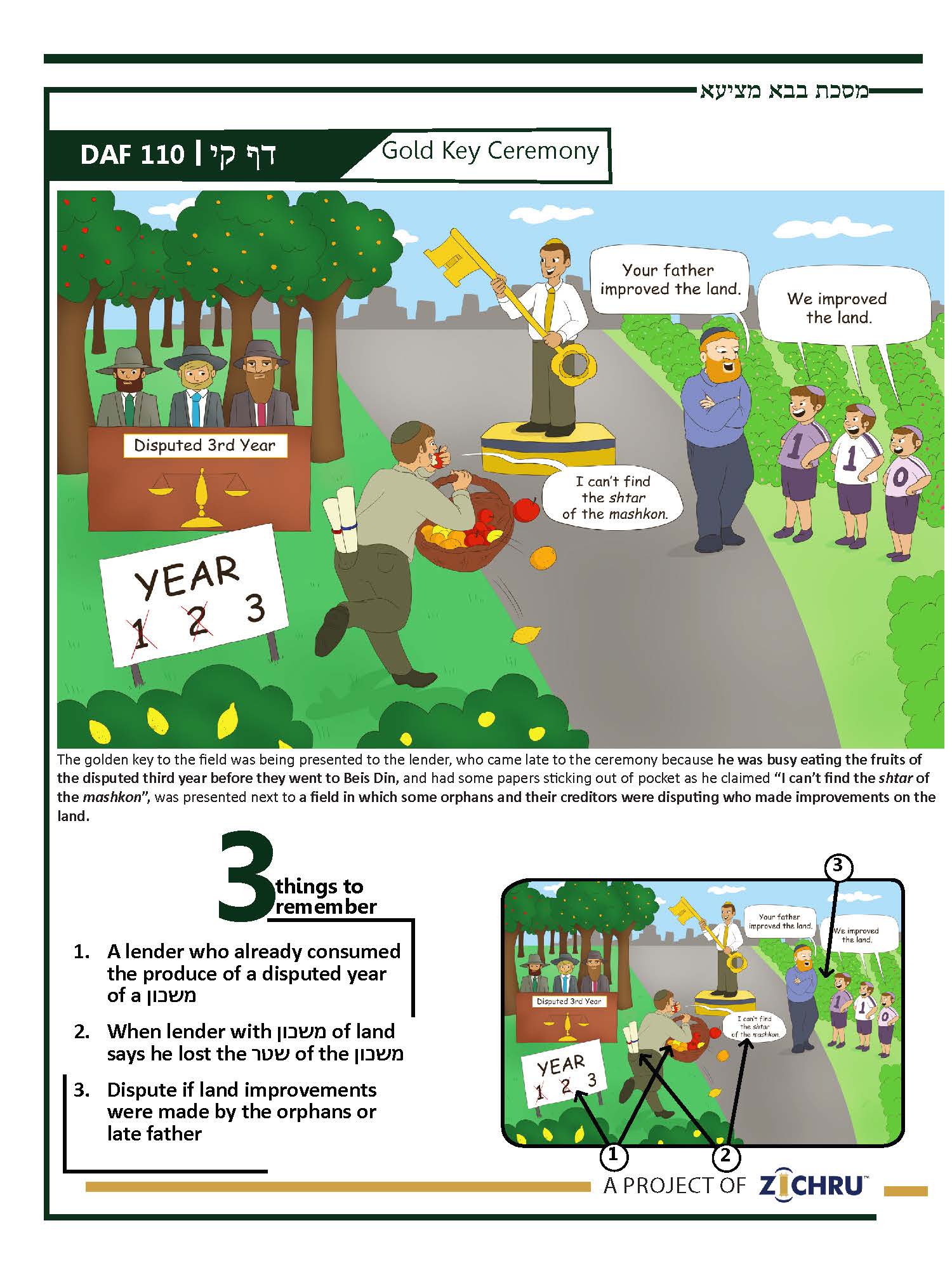Bava Metzia - Daf 110
- Audio Timestamps
0:00 - The 3 Sugyos
2:43 - Review of 3 Sugyos
5:12- Siman
8:03 - 4 Blatt Back Chazarah
15:06 - Pop Quiz (Last 7 blatt)
- For access to all Zichru resources including PDFs, and illustrations CLICK HERE
- A lender who already consumed the produce of a disputed year of a משכון
The Gemara discusses a משכון of land which was given for a number of years, during which the lender could consume its produce, but the שטר did not indicate the number of years. The lender claimed the term was three years, and the borrower claimed it was two, and the lender consumed the produce of the third year before they went to court. Rav Yehuda said: קרקע בחזקת בעליה קיימא – land stands in its owner’s possession, and its produce is presumed his (the borrower’s) until proven otherwise. Rav Kahana said: פירות בחזקת אוכליהן קיימי – fruits stand in the possession of he who consumed them, so the lender need not pay for them until the borrower proves his case. The halachah follows Rav Kahana. The Gemara objects that the halachah follows Rav Nachman, who ruled elsewhere that land stands in the owner’s possession (regarding the disputed month of a rented bathhouse)!? The Gemara answers that here, מילתא דעבידא לאיגלויי היא – it is something where the truth is likely to become revealed, ואטרוחי בי דינא תרי זמני לא מטרחינן – and we do not risk bothering Beis Din twice (if the lender will later bring proof).
- Dispute if the term of a משכון of land was five or three years
The Gemara discusses a משכון of land which the lender claimed was for five years, and the borrower claimed it was only for three. After three years, the borrower demanded the lender show the שטר of the משכון, but the lender said he lost it. Rav Yehudah said the lender is believed to retain the land for two more years, מגו דאי בעי אמר לקוחה היא בידי – since, had he wanted to lie, he could have said, “I purchased the land from you,” since a buyer who occupies purchased land for three years is believed to say he lost the שטר. Therefore, we presume his claim that the משכון is five years is truthful. Rav Pappa said that Rav Zevid and Rav Avira disagree with this ruling, and reason: האי שטרא כיון דלגוביינא קאי – this document of the משכון, which is used for collecting the land’s produce temporarily, מיזהר זהיר ביה – [a lender] is certainly careful with it, and it is so unlikely that it was lost, that he is not even believed based on a "מגו" argument. ומיכבש הוא דכבשיה לשטריה – Instead, we assume he is hiding his document, in order to claim additional time for his משכון.
- Dispute if land improvements were made by the orphans or late father
If orphans of a debtor say, “אנו השבחנו” - We improved the land, and those improvements cannot be collected by the creditor,” ובעל חוב אומר אביכם השביח – but the creditor says, “Your father improved the land, so the improvements are subject to collection,” Rav Chanina thought to say: ארעא בחזקת יתמי קיימא – the land is in the orphans’ possession, so it is incumbent on the creditor to prove that the father made the improvements. However, a certain elder said that Rebbe Yochanan ruled that the burden of proof is on the orphans, and the Gemara explains: ארעא כיון דלגוביינא קיימא – since the land is subject to collection by this creditor, כמאן דגביא דמיא – it is like it is already collected and in his possession. Rashi explains that since the Gemara below concludes that even if the orphans made the improvements, it is paid out to them in cash, and the creditor keeps the land, the dispute is reduced to one about monetary payments, and not land ownership. Thus, the burden of proof is on the orphans.
Siman – Gold Key Ceremony
The golden key to the field which was being presented to the lender, who came late to the ceremony because he was busy eating the fruits of the disputed third year before they went to Beis Din and had some papers sticking out of his pocket as he claimed, “I can’t find the shtar of the mashkon”, was presented next to a field in which some orphans and their creditors were disputing who made improvements on the land.


